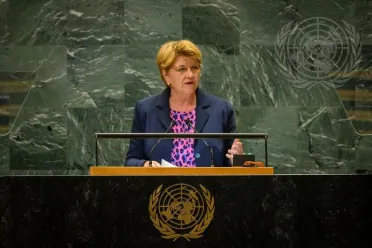Statement
Statement summary
VIOLA AMHERD, President of Switzerland, recalled her “yes” vote on 3 March 2002, when her country decided to join the United Nations, as the Swiss people expressed the country’s resolve to show its responsibilities and participate in international politics in the spirit of solidarity. Speaking a few days before the Swiss presidency of the Security Council, she stressed that Switzerland is increasingly concerned by worsening tensions around the world and the emergence of new conflicts. With great challenges like wars and disasters, as well as with the risks and opportunities linked to technological progress, the United Nations, as the only universal organization, is absolutely central in tackling these issues, she emphasized, adding that the request for peace prevails over all else and her country is committed to this, having brought together around a hundred States and international organizations this summer at the high-level conference on peace in Ukraine.
Reminding that the Geneva Conventions, whose seventy-fifth anniversary is commemorated this year, govern the legal basis for war and the protection of civilians, she said that recent United Nations figures paint a bleak picture of the international community. “Not only are people and the civilian infrastructure insufficiently protected, but they are coming under repeated attack,” she said, spotlighting violations of international humanitarian law in Myanmar, Ukraine, the Middle East and Sudan. She also said her country has been firmly committed to ensuring that the Security Council adopts ceasefire resolutions in Gaza and Sudan. The heavy price paid by civilians in these crises and conflicts makes Switzerland even more resolved to continue to view international humanitarian law as a top priority. “Respecting it is at the heart of our commitment within the Security Council,” she stressed, pointing out that, whilst some peacekeeping missions have not always achieved the aims set out, they contribute daily to human security, stability and peace.
Turning to climate change and biodiversity loss that have an existential impact on a growing number of people, she urged to maintain the commitment in these areas and take courageous measures for the future. “I am also concerned by the uptake in disinformation — this undermines freedom of opinion based on facts,” she continued, saying that private and State actors spread false information in their own and other countries in order to deepen polarization, sow discord and destabilize States. “Switzerland is firmly committed to freedom of expression and to freedom of the media — disinformation is a poison,” she emphasized, calling for better distinguishing between what is freedom of expression and what is a manipulation of facts, as well as for debunking illegitimate influence, fostering open and fair debate, providing transparent and objective information as Governments and international organizations.
Recalling that Switzerland is firmly committed to strong and effective multilateralism, she said her country stands out for its regular democratic debates at all levels — in municipalities, regions and the Confederation. “There is an urgent need to restore such a constructive and peaceful debate between States in order to tackle existential challenges,” she stressed, referring to the Pact for the Future which is a strong commitment to multilateralism, with the 2030 Agenda as one of its key dimensions that must be jointly implemented as quickly as possible. Speaking about a needed framework to work in partnership to find solutions, she reminded that it is the United Nations which provides precisely this framework. “It is up to us to make this institution stronger,” she concluded.
Full statement
Read the full statement, in PDF format.
Photo

Previous sessions
Access the statements from previous sessions.
